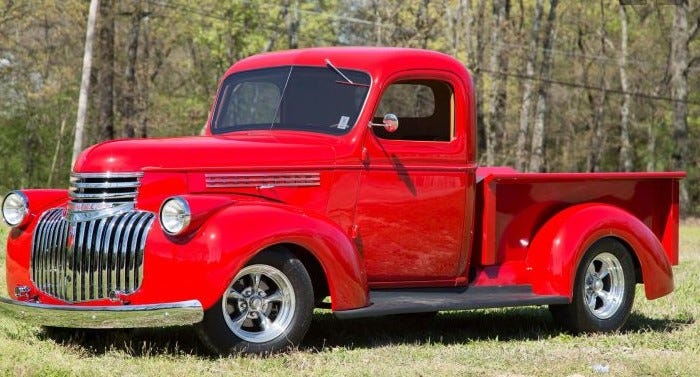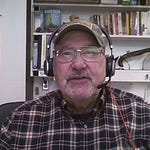
Most of us can claim two grandfathers. A growing number of us are fortunate to have 3 or 4, or even more. The one I knew was a quiet, God-fearing farmer with a modest cattle herd.
Hay for the cattle
On a day most vivid to me, I rode with him in his ancient Chevy 3-quarter-ton pickup to a rural pasture 15 miles from town. The Chevy pulled a similarly ancient trailer, the kind made from a rusted pickup bed, which had no doubt been harvested from a salvage yard. It was a picture of 1960s mid-west agrarian frugality: No extra expense for frills.
On this day, the pickup beds — both towing and towed vehicles — were filled with hay bales. To my 12-year-old eyes, the loads were stacked impossibly high. They were held with ropes across the top, tied securely — sort of — to the truck frames. I thought, Maybe we will drive slow.
We were taking the hay to Grandpa’s cattle, no doubt to supplement winter pasture.
Always a man with an eye to costs, he wanted to record the quantity of hay to be delivered. For some reason he had not merely counted the hay bales as he had loaded them: No, we would weigh the loaded rig at the COOP elevator on the way out of town, then on the return trip, empty, we would cross the scales again. The difference would be the weight of the commodity.
He drove. I sat in the rattletrap truck on a tattered seat cushion that leaked stuffing. Windows were rolled down. Seatbelts were a luxury for the well-to-do, and unavailable when that model had been manufactured.
Weighed in the balance
Grandpa turned off Main Street and navigated the pickup onto the long scales platform integrated into the pavement at the elevator, rolling to a stop. We both remained in the cab while the attendant at the window printed out a weigh ticket, then gave a short wave indicating we could move on.
The customary way to exit the scales was to drive straight forward, then follow the gravel path around the elevator structure (where wheat would be dumped during harvest), exit through the alley, and then back onto Main Street.
For some reason on this morning, Grandpa decided to shoot a slow U-turn from the scales, turning inside the yard, planning to return to the street the way we had come. The yard was narrow, flanked on one side by the office building and scales, on the other by a storage warehouse with a loading dock.
He nosed the Chevy into a tight left-hand turn, as I listened to the chassis and the trailer creak with stress. I could see he would not have room to complete the turn. I suppose he saw the same simple problem of geometry, but he did not stop until the front bumper touched the heavy timbers of the loading dock.
The moment of truth
There we sat, the pickup hemmed in by the loading dock in front and the short trailer virtually jack-knifed behind, engine idling. Grandpa was suddenly as nervous as I had ever seen him.
The trailer had a short drawbar and a short wheelbase, a configuration almost impossible to maneuver in reverse gear. It was made worse by the inability to see around the load in the pickup bed, save for a single, cracked outside mirror on the driver’s side.
There was nothing for it but to try. He put the floor-mounted gearshift into reverse and began to back up. No dice. The contraption immediately protested as the angle from pickup to trailer sharpened. I could see he was having difficulty deciding which way to turn the steering wheel as he reversed.
A cuss word escapes
After 3 or 4 iterations of this losing maneuver, he finally cursed out loud in my presence. I had never before heard any sort of expletive from this respected, church-going, teetotaling, tobacco-rejecting, Christian man. The single word, “Thunderation!” exploded from his lips.
I looked across to him in shock. He placed the useless transmission into neutral and let the engine idle. I knew he was humiliated before the unseen watching eyes of the COOP staff.
“Grandpa,” I ventured tentatively, “do you want me to try?”
Eyes forward, face a mask of frustration, he finally said, “Well, go ahead. See if you can get us out of here.”
We both exited the vehicle to change places. I took my place behind the wheel, depressed the clutch pedal and shifted into reverse. I had seen that he had been turning the steering wheel to the right, actually increasing the angle of the trailer hitch and making the problem worse. I tried the opposite way, which a few years later — but certainly not then — would become intuitive to me.
A fine time to learn to back a trailer
By some miracle of trial-and-error, I hit on the right combination, muscling the wheel further to the left and coaxing the trailer backwards.
I learned later that experienced drivers would call this “following the trailer.”
The single word, “Thunderation!” exploded from his lips.
After several very short movements back and forth, a few inches at a time, the trailer straightened out sufficiently to allow useful manipulation. I finally pulled to a stop parallel to the loading dock, and we changed places again, resuming our trip to the pasture.
Real men have issues — and that’s okay
Surprisingly, from this incident Grandpa grew in my pre-teenage esteem. He became more to me an example to follow. I suppose that was due to the humility and honest frustration he had evidenced. This was a real man, with real limitations and real weaknesses.
Somehow, this authorized my own self-assessment: It gave me a permission, of sorts, to acknowledge short-comings. I suppose this is what the Apostle meant when he wrote, “Do not think of yourself more highly than you ought, but rather think of yourself with sober judgment.” (Romans 12:3)
Days: No. Moments: Yes.
Nigel Vardy’s 2017 blog post carries a pithy title: “We Do Not Remember Days, We Remember Moments…” Vardy describes himself as a “Mountaineer, Adventurer and Motivational Speaker.” His post reflects the words of the tragic genius Cesare Pavese, a World War 2-era Italian poet who made his mark resisting Mussolini’s fascism. Pavese paid the price for his principled opposition with a prison term and eventual suicide.
Vardy’s essay is an encouragement to develop your own stories and tell them: To family, to grandchildren, to traveling companions, to those who will follow you. Insightfully, he writes, “The digital world can record everything, but relate to nothing.”
A shared experience, never to be repeated (hopefully!)
My grandfather never mentioned the episode with the hay bales again. He was probably embarrassed by it. In my mind, however, it made him human and approachable, and was a moment we shared together. I recognized his weaknesses — a U-turn in the COOP yard was an amateur’s mistake — and that is exactly what endeared him to me.
Pocketknife at the ready
My other grandfather was the one who impulsively cut the steel ring from the nose of a dead bull on a cattle ship, working his way across the Atlantic Ocean to Europe in about 1910. I would love to have heard that story from him — another flawed man who rides high in my estimation — but alas, he was gone before I showed up.
“The digital world can record everything, but relate to nothing.”
About the only lessons I took from the second-hand version of that story were (a) seize opportunity when it is present, and (b) always carry a pocketknife.
We still have the bullring, a simple, unadorned, 3-inch-diameter welded circle of quarter-inch round bar. I was always rueful that the treasured artifact was in my brother’s possession, until I found a plentiful supply of exactly the same ring at a metal recycle yard a hundred years after the event. I bought half a dozen rusted replicas for $.50 each.
So there.
At Your Best Retirement, we are more about impact than information. We would urge you to consider your legacy in terms of the memories and traditions important to you.
Pro-tip: It might be more useful to think in terms of what you learned from someone other than yourself. Telling a story where “I learned this from my struggle,” can be preachy and self-serving. Rather, telling, “This is what I learned from the struggle of [fill in the name],” can be easier to pull off.
Challenge Question
This week’s Challenge Question:
Record a life lesson you have embraced from a character you have personally known and admired. Construct a few short paragraphs explaining the situation and why it was impactful.
Download the Challenge Tracker, a simple one-page pdf where you can record your thoughts. Save it, either digitally or by printing a hard-copy. It’s easy and free. Click the link below.
What does the Scripture say?
Children’s children are a crown to the aged, and parents are the pride of their children.
Proverbs 17:6
We children, all of us, have a deep desire to brag on our parents. In most cases, they are the people we know best. While there are surely innumerable faults and resentments in this world owing to mistreatment by the previous generation, those failures only accentuate the deep longing to believe in and share something good about Mom or Dad.
Sometimes, that story of parental failure (or worse) is tragic. But also, sometimes, there is a slice of a memory that makes us swell with pride that we knew that unforgettable character. For, as Nigel Vardy reminds us, “We Do Not Remember Days, We Remember Moments.”
Identify one of your moments, and pass it along. That telling may in itself be the moment which someone remembers of you.
Get the Challenge Tracker; it gives you an easy place to store the memory.
Thanks for following Your Best Retirement.













Share this post